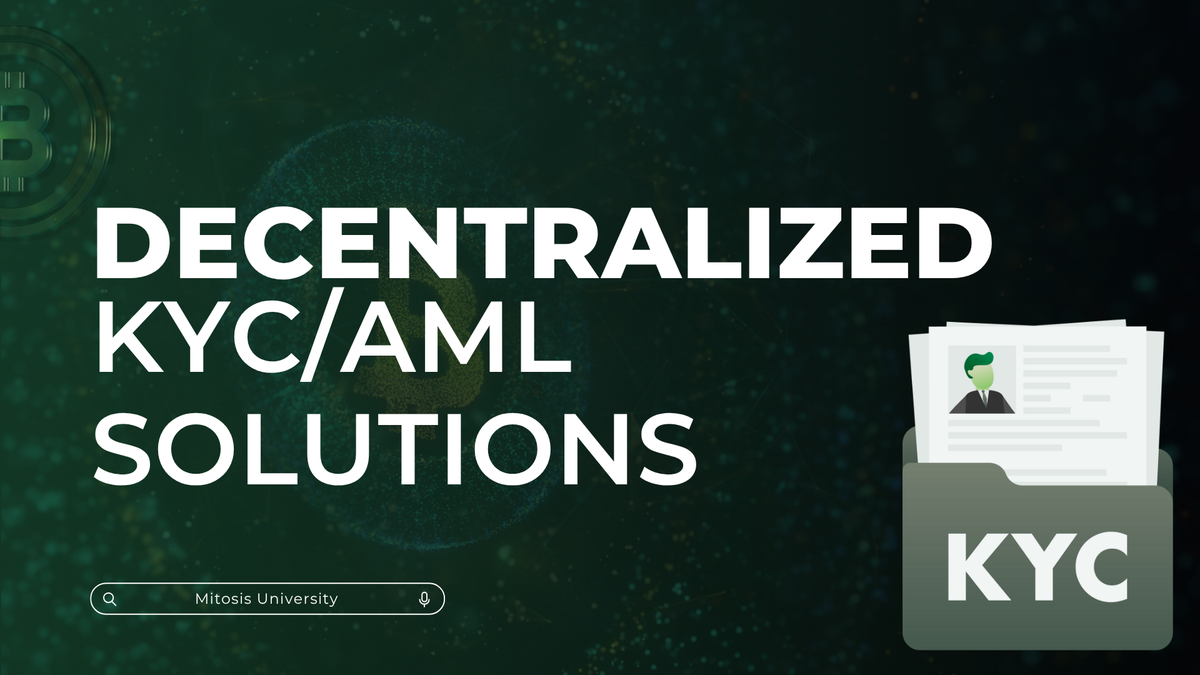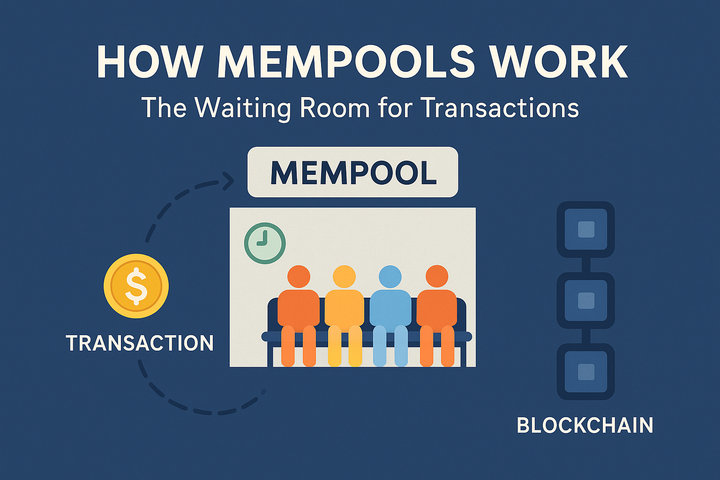Decentralized KYC/AML Solutions

Introduction
KYC (Know Your Customer) and AML (Anti-Money Laundering) are regulatory frameworks essential for preventing financial crimes like money laundering and terrorist financing. Traditionally, these processes rely on centralized systems where financial institutions collect, store, and verify customer data. However, in the cryptocurrency and blockchain space, these centralized approaches face significant challenges, including privacy breaches, data security risks, and inefficiencies, particularly in cross-border transactions.
Decentralized KYC/AML solutions leverage blockchain technology, a distributed ledger that offers transparency, immutability, and security, to address these issues. By decentralizing the storage and verification of customer data, these solutions aim to enhance privacy, reduce costs, and improve compliance efficiency. This report examines how these solutions work, their impact on privacy and compliance, and their potential to transform the financial sector.
Challenges with Traditional KYC/AML Systems
Traditional KYC/AML systems, reliant on centralized databases, have several limitations:
- Privacy Concerns: Customers must share extensive personal information, increasing the risk of data misuse or breaches. For instance, centralized databases are prime targets for hackers, potentially exposing sensitive data of thousands of customers.
- Data Security Risks: A single point of failure in centralized systems can lead to significant financial and reputational damage. High-profile breaches have highlighted these vulnerabilities, eroding trust in traditional systems.
- Inefficiencies: Verifying identities and monitoring transactions can be time-consuming and costly, often delaying customer onboarding. This is particularly problematic in the fast-paced cryptocurrency market.
- Lack of Interoperability: Different institutions may have varying KYC/AML requirements, leading to redundant checks and increased operational complexity, especially across jurisdictions.
Research suggests these challenges are amplified in the cryptocurrency space, where users prioritize privacy and where transactions can span multiple regulatory environments. For example, AML and KYC systems are estimated to cost financial institutions between $900 million and $1.3 billion annually, underscoring the need for more efficient solutions.
Decentralized KYC/AML Solutions: How They Work
Decentralized KYC/AML solutions use blockchain technology to create a distributed, secure, and efficient framework for identity verification and transaction monitoring. Key mechanisms include:
- Sovereign Identities: Blockchain enables users to create and control their own identity data, stored on a decentralized ledger. Users can selectively share verified information with institutions, reducing the need for repetitive KYC checks across platforms. This empowers individuals to maintain ownership of their data, enhancing user trust.
- Consortium Blockchains: Financial institutions can form consortium blockchains to share KYC/AML data in real-time. Once a customer’s identity is verified on the network, it can be recognized by all participating institutions, streamlining onboarding and reducing operational overheads.
- Smart Contracts: These self-executing contracts automate KYC/AML processes, enforcing compliance policies such as transaction limits based on risk assessments. This automation reduces human error and ensures consistent application of rules, improving efficiency.
- Secure Data Sharing: By storing data on a blockchain, the risk of data breaches is significantly reduced. Data is encrypted and distributed across multiple nodes, making it nearly impossible for malicious actors to tamper with or steal sensitive information. Consensus mechanisms ensure agreement among participants, enhancing system security.
These features address the inefficiencies of centralized systems, offering a more secure and user-centric approach. For example, KYC Chain supports document authentication from over 240 countries and provides comprehensive reports for audits, demonstrating practical implementation.
Privacy in Decentralized KYC/AML
Privacy is a critical concern in KYC/AML processes, especially in the cryptocurrency space where users often prioritize anonymity. Decentralized solutions enhance privacy through:
- Selective Disclosure: Users can choose what information to share with each institution, minimizing the exposure of sensitive data. This reduces the risk of data being centralized and exploited, aligning with user expectations for privacy
- Zero-Knowledge Proofs (ZKPs): ZKPs allow users to prove certain facts about their identity without revealing the underlying data. For instance, a user can prove they are over a certain age without disclosing their exact birthdate, balancing privacy and compliance needs
- Decentralized Identity Systems: These systems enable users to maintain control over their identity data, sharing only what is necessary for regulatory purposes. This approach reduces privacy risks while ensuring compliance, particularly important in privacy-oriented crypto communities
By implementing these technologies, decentralized KYC/AML solutions can significantly reduce privacy risks while meeting regulatory requirements. This balance is crucial, as traditional systems often require extensive data sharing, which can deter users concerned about data protection.
Compliance with Regulations
Despite their decentralized nature, these solutions must comply with existing KYC/AML regulations, such as those set by the Financial Action Task Force (FATF). Blockchain technology facilitates compliance through:
- Immutable Audit Trails: Every transaction and identity verification on the blockchain is recorded immutably, providing a transparent and tamper-proof history that regulators can audit. This ensures accountability and traceability, essential for regulatory oversight.
- Real-Time Monitoring: Blockchain’s transparency allows for continuous monitoring of transactions, enabling quick detection and reporting of suspicious activities. This real-time capability enhances compliance efficiency, particularly in detecting money laundering.
- Consensus Mechanisms: These ensure that all participants in the network agree on the validity of transactions and data, preventing manipulation and enhancing system integrity. This aligns with regulatory needs for secure and reliable data.
Moreover, decentralized solutions can be designed to integrate with existing regulatory frameworks. For example, virtual asset service providers (VASPs) must comply with FATF guidelines, which include implementing KYC checks and monitoring transactions for suspicious activity. Tools like Chainalysis Reactor assist in investigating fund flows and linking illicit activity to real-world identifiers, supporting compliance efforts.
Future Outlook and Potential Developments
The adoption of decentralized KYC/AML solutions is still in its early stages, but it holds significant promise for the future of financial compliance.
- Increased Interoperability: Standardized protocols for decentralized identities could enable seamless KYC across different platforms and jurisdictions, reducing redundancy and improving efficiency. This could facilitate global adoption, particularly in the cryptocurrency space.
- Enhanced Security: Advances in cryptography and consensus mechanisms will further secure decentralized systems against threats, addressing concerns about data integrity and system reliability. This is crucial for gaining regulatory and user trust.
- Regulatory Acceptance: As regulators become more familiar with blockchain technology, they may develop guidelines that specifically address decentralized KYC/AML. This could foster wider adoption, aligning with evolving regulatory landscapes, such as the EU’s 5AMLD and the U.S. Bank Secrecy Act.
However, challenges remain, including standardization, regulatory alignment, and user adoption. The evidence leans toward a future where decentralized KYC/AML solutions become integral to financial systems, but their success will depend on addressing these hurdles.
Conclusion
Decentralized KYC/AML solutions represent a paradigm shift in how financial institutions approach compliance and privacy. By leveraging blockchain technology, these solutions offer a more secure, efficient, and user-centric alternative to traditional methods. They enhance privacy through selective disclosure and ZKPs, ensure compliance with immutable audit trails and real-time monitoring, and show promise for future interoperability and regulatory acceptance. As the industry continues to innovate, we can look forward to a future where privacy and compliance are no longer at odds, but rather complementary aspects of a robust financial system.
Key Citations
- KYC Chain Home Page
- Implementing Blockchain-based Solutions for KYC/AML Compliance
- Implementing KYC/AML in Crypto Exchanges
- What is AML and KYC for Crypto?
- Cryptocurrency KYC & AML Solutions
- KYC Crypto Solution KYC/AML Verification
- KYC, AML The blockchain’s role in crypto compliance
MITOSIS official links:
GLOSSARY
Mitosis University
WEBSITE
X (Formerly Twitter)
DISCORD
DOCS



Comments ()